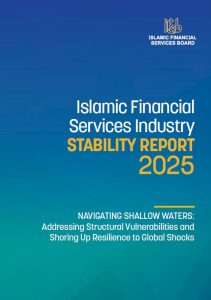Kuala Lumpur, 16 May 2025 – The Islamic Financial Services Board (IFSB) today released the 13th edition of its flagship Islamic Financial Services Industry (IFSI) Stability Report 2025. Themed “Navigating Shallow Waters: Addressing Structural Vulnerabilities and Shoring Up Resilience to Global Shocks,” this year’s report reflects renewed momentum across the industry, with total global assets reaching USD 3.88 trillion in 2024—a 14.9% increase year-on-year. Broad-based growth was observed across Islamic banking, ṣukūk, and Islamic insurance, signalling deepening market participation, growing global relevance, and broadening geographical reach.
Key takeaways from the 2025 report include:
The report outlines a forward-looking set of policy priorities to address these limitations and unlock the potential growth of Islamic finance. It calls for coordinated action among regulators, policymakers, and industry stakeholders to address these challenges to ensure the sound development of the Islamic financial services industry.
First published in 2010, the IFSI Stability Report has become a key reference for global stakeholders, regulators, and market participants. It offers in-depth insights into industry trends, vulnerabilities, and evolving policy priorities shaping the future of Islamic finance.
The IFSB Islamic Financial Services Industry Stability Report 2025 is now available at www.ifsb.org/publications.
